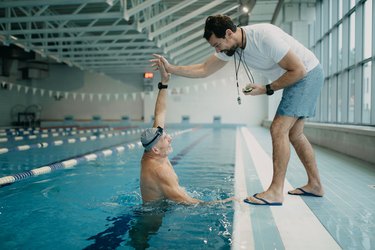
Compared to other pool races, a 100-meter swim isn't a particularly long distance. But swimming any distance as fast as you possibly can is certainly no small accomplishment.
Looking to see how your 100-meter swim time stacks up against others? Learn the average 100-meter swim time, including swimming factors that may be keeping you from achieving a new personal record.
Video of the Day
Video of the Day
How Long Is 100 Meters?
Swimming 100 meters is the equivalent of 0.06 miles and is two full lengths in an Olympic-size pool.
Average 100-Meter Swim Time
Your average 100-meter swim time — yes, this is different than your 100-meter dash average time, which is running-specific — depends on a variety of factors, including your pool size, age and swim experience (more on that below). But, for the most part, an average, comfortable time for 100 meters is about 2 minutes, according to U.S. Masters Swimming.
Keep in mind, that time isn't necessarily good or bad. For a beginner adult swimmer, even just completing the distance without stopping is an accomplishment. But with improved technique and endurance, your swim times can improve, along with your performance times.
Related Reading
Worldwide 100-Meter Swim Records
Although you don't want to judge your performance too harshly, knowing world record times can give you an idea of how top swimmers perform. Use the chart below to learn the world records for the different 100-meter races divided by gender, according to the Federation Internationale de Natation (FINA).
Men's World Record 100-Meter Times
Race | Record | Athlete |
|---|---|---|
100-meter Freestyle | 46 seconds, 86 milliseconds | David Popovici (2022) |
100-meter Backstroke | 51 seconds, 60 milliseconds | Thomas Ceccon (2022) |
100-meter Breaststroke | 56 seconds, 88 milliseconds | Adam Peaty (2019) |
100-meter Butterfly | 49 seconds, 45 milliseconds | Caleb Dressel (2020) |
Women's World Record 100-Meter Times
Race | Record | Athlete |
|---|---|---|
100-meter Freestyle | 51 seconds, 71 milliseconds | Sarah Sjoestroem (2017) |
100-meter Backstroke | 57 seconds, 45 milliseconds | Kaylee McKeown (2021) |
100-meter Breaststroke | 1 minute, 4 seconds, 13 milliseconds | Lilly King (2017) |
100-meter Butterfly | 55 seconds, 48 milliseconds | Sarah Sjoestroem (2016) |
4 Factors Affecting Your 100-Meter Time
1. Pool Length
Relatively speaking, the 100-meter swim is a pretty short distance, so every little detail matters if you're looking to shave seconds off your personal record. Even the pool size makes a difference, which is why competition pools are restricted to precise dimensions.
Smaller pools can yield faster times because you can push off hard from the wall and typically swim faster under water before surfacing. Olympic pools measure 50 meters, so for a 100-meter swim, you make one turn to complete the distance. In a 25-meter pool, you push off the wall three times, so your time would likely be faster than in a larger pool.
2. Age and Ability
As with any kind of race, swim times vary according to age and ability. As mentioned above, average swimmers in an Olympic-size pool can comfortably complete a 100-meter swim in 2 minutes. But that time may not be realistic for older or inexperienced swimmers.
A competitive swimmer, like the world-record holders above, would likely be upset if they could not complete 100 meters under one minute. On the flip side, someone just starting out may be thrilled with simply completing the distance.
3. Racing vs. Swimming Laps
Your race time for this distance is most likely faster than a 100-meter lap interval because you usually perform a dive at the start of a race. When you dive into the water, you catch extra speed, shaving seconds off your time.
4. Turns
Flip turns help you shave time off of your 100-meter swim, too. A tight, quick somersault and strong push off the wall is the most efficient way to change directions in a pool. A bad flip-turn, though, slows you down and works against you. Turning too soon leaves you too much space to get a tight, coiled position for a push-off, and flipping too late can leave you without any room to maneuver.
Those who aren't comfortable with flip turns usually just grab the wall of the pool and turn around above the water. This can greatly affect your time, too.